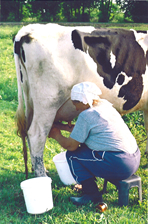Ida Harboe Knudsen
Curriculum Vitae
Current Project
|
After Lithuania had declared its indepence in 1990, the Lithuanian government, within a short time span, had to make important decisions for the further development of the agricultural sector. The situation in Lithuania, as well as in other post-socialist countries, was without any historical precedents, a reason why the government could not draw on any experiences from other countries. The goal was clear: the agricultural sector of Lithania was to be privatized and the private farmer re-established. But how it should be done was far from clear. The outcome of the process reflected the experimental and confusing period of transition: only a few big and competitive farms were created, along with a multiplicity of family farms with small and fragmented land plots. The majority of these family farms had little if any machinery and small and diversified productions which by no means could meet international standards. Improvements were hindered by the absence of farming skills, lack of machinery and lack of money.
|
 |

